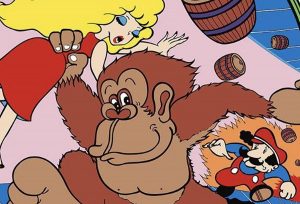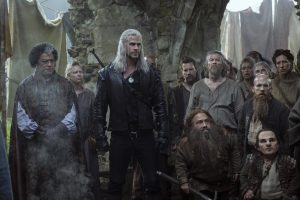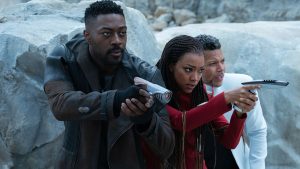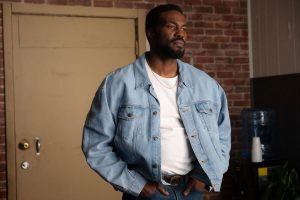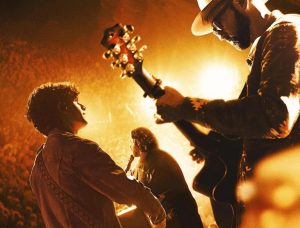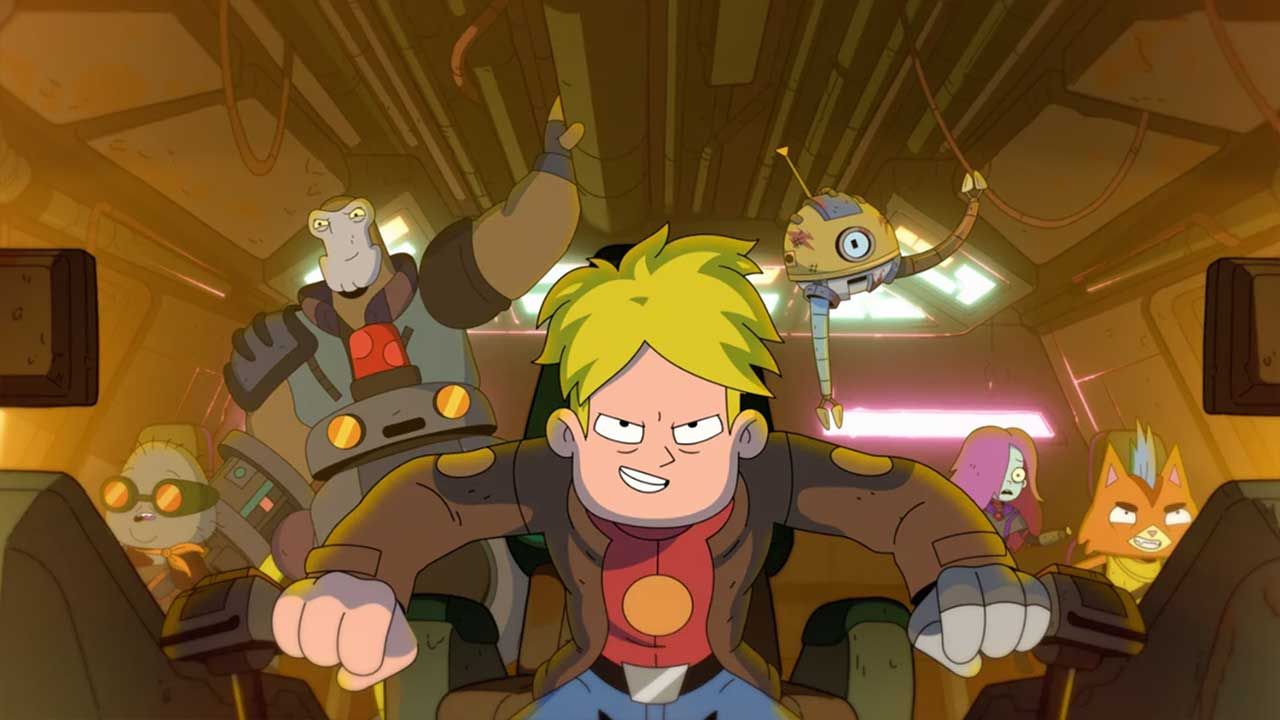
Gary Goodspeed drifts helplessly through the debris of his half-wrecked spacecraft, his only company the AI integrated into his spacesuit. He’s doomed to spin out irretrievably into the endless, unforgiving canvas of deep space. Remarkably, this bleak outcome doesn’t seem to trouble him too much, and that’s less because he has a last-minute plan up his sleeve, and more because his space suit is leaking oxygen, and he’ll be dead within 10 minutes.
Thus begins the saga of Final Space, an epic, sprawling, dimension-bending animated sci-fi adventure that romps its way through time and space, stopping off for heartbreak, hilarity and alternate realities along the way. Not to mention a multitude of increasingly perilous predicaments that will come to make Gary’s choking-to-death-in-the-void dilemma look like a simple bout of interstellar turbulence.
Over the course of three daring, darkly funny and delicious-looking seasons, Gary and his gaggle of battle-worn misfits raced to unlock the legendary realm of Final Space. With the fate of the universe hanging in the balance, they bravely faced down cut-throat mercenaries, super-powered despots, and planet-sized titans, always somehow living to fight another day. Until they didn’t. Ultimately, their gravest existential threat, the one that would spell their collective doom, came not from their universe, but from ours.
Cancelation
Final Space ended in 2020, leaving behind an unresolved cliffhanger and the broken hearts of millions of fans and admirers. This was no run-of-the-mill cancelation. That would have at least provided some small measure of solace, because something of the series would have endured. The reality was a lot more Kafkaesque, because Final Space was – for all intents and purposes – erased from history, as surely as if Q or Thanos had snapped their fingers to make it so.
It’s hard to know what tense to use when describing Final Space, given that its episodes are now only available to those who are either already in possession of physical copies, or foolhardy enough to navigate the pirate-infested waters of the web, but it seems fitting – given the spirit of optimism in which the series was forged, and on which note we hope to conclude – to discuss Final Space in real-time terms; as though this work of art, this labor of love, were still expanding and evolving into the future, instead of what it’s sadly become: an experience that now exists only in the collective imagination.
While ‘TV show shot down in its prime’ isn’t exactly an unfamiliar headline here in the streaming age (and animated sci-fi shows that aren’t about dinosaurs, or drunk, portal-hopping nihilists, seem particularly vulnerable to mid-run termination), the story of Final Space’s inception, gestation, cancellation and annihilation embodies more pain and pathos than most. But it also carries the kernels of surprising and touching configurations of optimism, passion, hope and resilience. Which is why it’s a story worth telling.
Here’s how Final Space came to be, came to end, what it was, and why its legend and legacy matters.
A Tale of Two Main Characters
Final Space boasts a full-color palette of complex, larger-than-life characters, among them Catto: a grizzled, feline warrior with Worf-like stoicism who’d do anything to rescue his son and erase the guilt of his past; The Lord Commander: a despicable demigod with delusions of grandeur and a dark heart set on galactic conquest; and the adorable Mooncake: a flying green blob of world-ending power and heart-melting innocence that easily gives Baby Yoda a run for his money in the cuteness stakes.
But it’s Gary Goodspeed, for better and worse, who serves as the anchor at the series’ heart, both our entry-level admission ticket to this universe, and the embodiment of all of that universe’s hope, humanity and inanity.
Gary is a great many things: plucky space cadet; former felon; Clouseau-esque clod. He’s equal parts bumbling daydreamer to hopelessly loquacious romantic. Sometimes just hopelessly loquacious, to the point where other characters – and occasionally the audience – want to jettison him from the nearest airlock. Imagine an amalgamation of Futurama’s Fry, Red Dwarf’s Lister, and The Last Man on Earth’s Phil ‘Tandy’ Miller, mixed with a pinch of puppy dog and a soupcon of Buzz Lightyear.
He begins Final Space as a drifter (very literally in his case), a dreamer who’s underestimated by everyone around him, not least of all himself. Over the course of the show’s run, as the stakes rise and Gary begins to grapple with ideas of damage, darkness and destiny, he slowly matures into a daring and dependable hero, painted in complex shades of dark and light. He’s still a big-hearted, big-mouthed joker, but one who’s much greater, and richer, than the sum of his parts.
Arguably, then, Final Space follows the same tonal trajectory as The Orville, beginning its first season as something more akin to pure comedy, albeit one with dark moments of drama, and then wrangling with the yin and yang of that before settling into a third season that’s first and foremost dark, dramatic and character-driven, with the comedy flowing organically from the confluence of those elements.
Gary is voiced by series creator Olan Rogers, and it’s hard not to see roots of the latter in the former. Both are men who navigate the darkness of the world by the torchlight of humor, but are nevertheless unafraid to feel and show their emotions. In Gary’s case that’s manifested through his affection for fellow cadet Quinn, which begins as tongue-lolling infatuation but deepens into a truer love as their destinies intertwine (and gets more complicated when an ass-kicking variant of Quinn arrives from the future), expressed at first in obsessive soliloquies and then through companionship and selfless acts of sacrifice.
In Olan’s case, it’s the raw earnestness with which he’s engaged with the show and its fans throughout Final Space’s lifespan, especially in those times when the news hasn’t been good. When he speaks you can feel the full force of the love he feels in abundance for his creation. He always wants you to know how grateful he is – to fate, to the fans – and takes pains to hammer home the egalitarian message that with enough pluck and sweat anyone can achieve what he’s achieved. No matter the bleakness of a situation he always manages to buoy sadness with hope: the ultimate cosmic lesson in making lemonade out of lemons, or Mooncake out of moondust.
In the Beginning
You’d be forgiven for assuming that a show picked up and nurtured by Conan O’Brien and his production company, and featuring the titanic voice talents of – among many others – Doctor Who’s David Tennant (playing arch villain The Lord Commander), The Walking Dead and Invincible’s Steven Yeun (Little Catto), and Saturday Night Live’s Fred Armisen (the obnoxious robot KVN), sprung to life from some nepotistic broth in a Hollywood laboratory, but the truth is that Olan, like Gary, came from relative obscurity to realize his greater dreams and destiny through a combination of hard work, hard lessons and sacrifice.
As a child, Olan had an audience of two: his father and his brother. He’d make little movies for them, and beg them to watch, happy just to be making his family happy, little realizing that in a matter of decades his work would be adored by millions.
As an adolescent he started a YouTube channel with two college friends called BalloonShop, a comedy smorgasbord of skits and sketches that quickly found an appreciative audience, and showcased Olan’s unique blend of anarchic yet intelligent humor. It quickly became apparent that comedy alone wasn’t enough to satisfy Olan’s creative juices. Branching out solo, he began to experiment with longer-form storytelling in his personal projects, leaning as much into darkness as humor. But a restorative darkness: the kind that doesn’t swallow the light, but bring it into clearer focus.
Final Space – the idea that would become it, in any case – had a long gestation period. It would be many years and attempts before his painstakingly self-produced pilot for the show, uploaded to YouTube, would come to the attention of Conan O’Brien and his production company Conanco. From that moment Olan was thrust into a world of showrunners, big budgets and back-room deals that his childhood self could scarcely have dared to imagine. David Sacks – who’d been a producer of The Simpsons in its heyday and went on to steer Third Rock From the Sun among other acclaimed comedy shows – was appointed showrunner, and Olan’s dream quickly grew wings and flew out into the cosmos, culminating in a maiden season that was warmly received by fans and critics alike.
Final Space began its life on TBS, but owing to a corporate merger – the first of two it would experience in its short life-span – moved to Adult Swim for season two. Working within the wider media landscape wasn’t without its own raft of challenges. With so many people involved in a project, and money men at the top of each pyramid shouting for results, it was inevitable that Olan’s journey would occasionally prove arduous. Indeed, Olan shared with a Reddit Q&A that his showrunner David Sacks had never seen so many network notes in his career than those he’d received for the show’s second season. The network wanted Final Space to be more episodic and lean harder into its dark humor, hoping it might one day become another Simpsons or Family Guy. This ran counter to Olan’s vision for the series as an ever-rolling, interconnected saga, in which humor, though important, wasn’t the primary driving force or raison d’etre.
Thankfully, Olan and David had more creative control over season three, culminating in an outing that Olan felt was narratively and tonally sympatico with the show he’d always imagined making; the one that had lived and grown inside his imagination for more than a decade. This was it. At the half-way stage of his grand plan (he had six seasons of stories in him) Final Space had found its feet. But a cliff-side stumble was just over the horizon. WarnerMedia, the show’s parent company, underwent a merger with Discovery, to create Warner Bros. Discovery, a corporate entity that began its life with a $2.5 billion black hole in its finances. Money had to be offset. Debt had to be lessened. Tax had to be eased. A cull would follow.
And Final Space wouldn’t survive it.
The End – and New Beginnings
The practice of companies writing off their products and assets to make large tax savings isn’t a new one, but it’s becoming a depressingly common feature of the media landscape. The unreleased Batgirl was also a casualty of WarnerMedia’s merger. Final Space was removed from every streaming service except Netflix (its last bastion, but its time there wouldn’t last long). Any plans to release season three on DVD or Blu Ray were nixed, and no further copies would be made or distributed of the first two seasons. The show had been surgically removed from existence. Not only would the show never be completed, but new audiences would have little idea that it had ever existed.
Things looked bleak for Olan, and the sadness seemed to hit him with megaton force. And yet he never lost hope. Never gave up. After doggedly pursuing every avenue of hope, Olan and his team managed to strike a deal with Warner Bros. Discovery that would allow him to finish the saga. Final Space won’t be returning to our screens, but the story will conclude later this year or early next year in a bumper-sized, limited-run graphic novel that’s currently available for pre-order on Olan’s website (as part of the deal struck, this is the only place from which it can be sold or distributed). And that’s before we even take into account the various projects Olan has immersed himself in, most notably the Kickstarter-funded pilot for the post-apocalyptic Godspeed , a spiritual successor to Final Space that’s available to watch on-line.
You make lemons from lemonade. You harness darkness to accentuate the light. You never stop fighting. That’s Olan Rogers’ message. And if it’s also Final Space’s legacy and final coda, then it’s a fitting one.
The post Final Space: TV’s Cruelest Cancelation? appeared first on Den of Geek.
